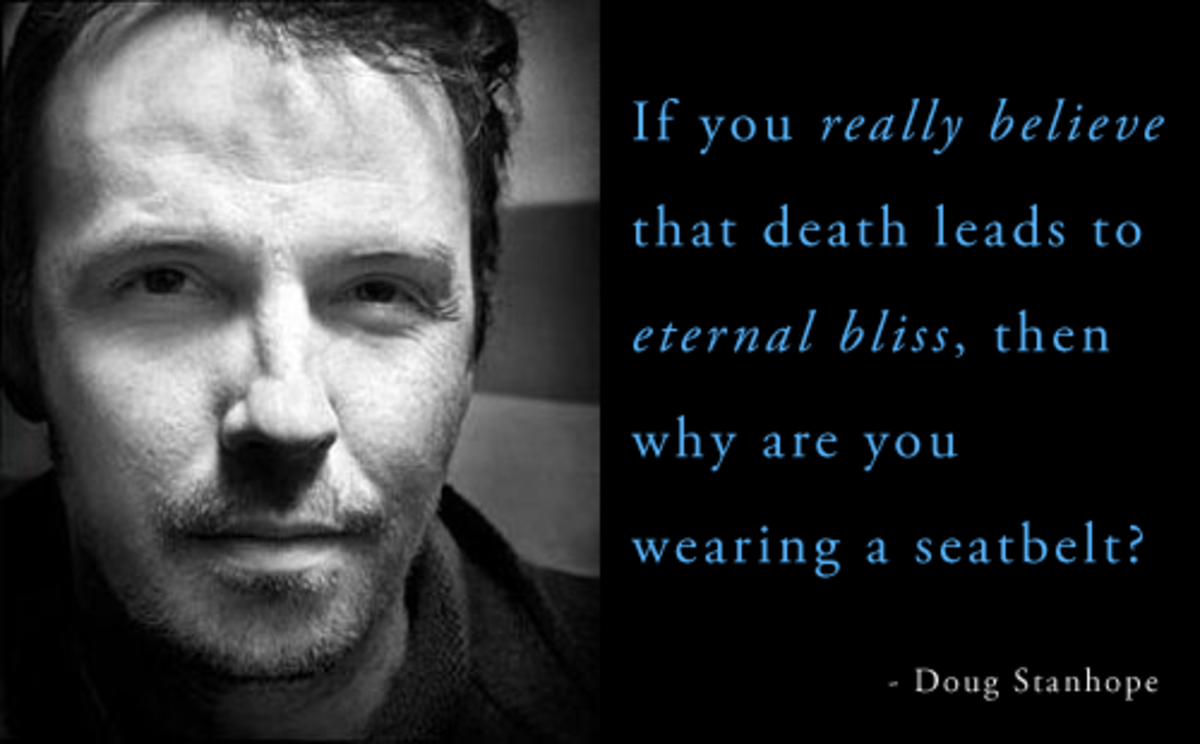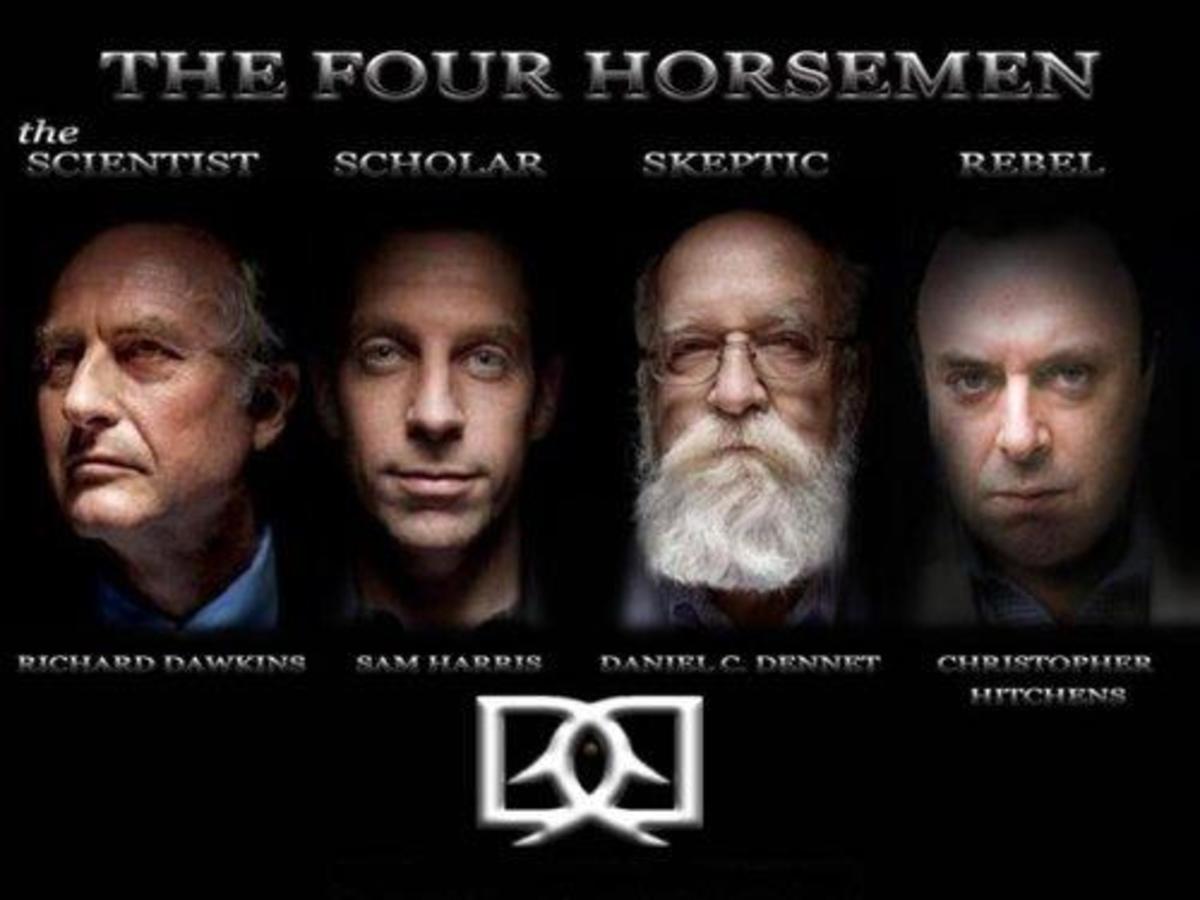Five Popular Argument Schemes that Christians Use Over and Over Again

...and Fail Miserably at
As an atheist of more than ten years, I've debated with many a Christian. However, it took taking a Philosophy of Logic class in college to really understand these tired arguments that Christians keep using, and how to address them appropriately. So now, I will share my wisdom with all.
Now, for some atheists, logic seems to come naturally. I have encountered many an atheist that can recognize an argument scheme immediately and shut his opponent up within seconds. Christopher Hitchens would be so proud. I, unfortunately, am not one of those atheists. The artistic side of my brain is the one I engage the most, so things like logic, math, and science don't come as natural to me. That doesn't mean I am not fascinated by them or do not respect them. I am and I do. So much so that whenever the opportunity presents itself I endeavor to learn more about these things. So, without further ado, here are five argument schemes that I analyzed from a Dawkins/Lennox debate, which I have posted below for your viewing enjoyment.
Dawkins/Lenox debate at Oxford University
Argument From Commitment
If you look at about the 7:40 mark on the video you will hear Lennox make a statement that goes something like this: Since you are an Atheist and you don't think there is any rationality behind the existence of the universe, you therefore believe it was a freak accident.
According to my Fundamentals of Critical Argumentation book, this is an argument from commitment. Basically what Lennox is doing is drawing a plausible conclusion that since Dawkins is an atheist, and an atheist doesn't believe in a creator of the universe to provide order, he therefore believes it was a freak accident, which is the opposite of order. This might hold up if those are the only two choices--either a universe with order and a creator, or a universe without it and chaos. However, as Dawkins goes on to state, there is a third option, and that is a model based on Darwin's natural selection theory.
So this argument becomes a fallacy because it does not follow that simply being an atheist demands that we believe that the universe was a freak accident. There are two critical questions that Lennox should have asked before making this argument. 1) What evidence is there to support the claim that Dawkins is an atheist that is committed to this "freak accident" theory and is there any evidence to suggest that he might not be? 2) Is there room for questioning whether this is an exception to the case or a general rule?
I think to most Christians it would seem that not supporting a universe with a creator might make it seem like atheists support a universe that was a freak accident, but that just isn't true. Here's where educating yourself on what an atheist really holds to be the truth would be very beneficial to a Christian before starting with this weak argument.
Appeal to Ignorance
Here, at the 11:40 mark on the video, Lennox poses another argument that just does not follow: Darwin's Theory doesn't explain the origin of life or of the universe. If the universe is assumed to be rationally intelligible there should be an explanation for these things, and God must be that explanation.
This is a bit of an appeal to ignorance. Lennox is suggesting that because a theory does not offer an ultimate explanation for everything this validates his personal belief in a god, and not just any god, mind you, but the Christian god, which is another fallacy all on its own. I think this is best described in more recent times as the "god of the gaps" theory by elite scientists. If there is no explanation, it has to be god, and since you don't have an explanation, either, you can't prove me wrong.
Well, nice try, Christians. If Lennox had done his homework he would see that the Theory of Evolution never makes any claims as to the origin of life or the universe. I think most Christians make this same mistake. The Theory of Evolution simply states that changes within a population of a species over time lead to genetic modifications. As for not having the answer to all of life's mysteries, we'll get there, eventually. In the meantime, we are not going to just give god credit for it. That would be cowardly and lazy.
Argument From Sign
I love this one. At the 17:30 mark Lennox makes this comparison: The universe functions by laws that are blind and automatic. My watch also functions blindly and automatically, but it had a designer, therefore, the universe had to have a designer, too.
Argument from sign is basically observing data in one case and taking it as a sign of something that fits a pattern. This is a defeasible argument and can only lead to a plausible conclusion, so at the very start it is a weak argument. So, once again Lennox's argument does not follow. There are plenty of things without designers in the universe--Darwin's studies have proven that. The problem is that most Christians just cannot wrap their mind around that fact. Even if they do accept evolution as a legitimate theory, they still might wonder, but where did all of this come from? Simply not knowing is not an option for them. They have to know and when there just isn't enough information to figure it out, god as an answer will do just fine.
Besides the Point or Red Herring
This next one is quite comical if you follow it in the video. At 34:00 Lennox makes this statement: There is massive injustice in the world. If there is no god then there is no ultimate justice. People will never be held accountable for their crimes, therefore there must be a god.
"Too bad!" is what Dawkins replies. I love it! Lennox's claim is highly irrelevant to the topic of god and science. What offers him comfort personally has no bearing on reality. One might just as easily find comfort in the idea of Superman offering ultimate justice. Does that make it the truth? Dawkins even concedes that yes, a world with ultimate justice and an ultimate reward for those who are good would be great, but that doesn't make it a reality.
Christians use this argument all the time. I think this one, and perhaps the circular argument is the one they use the most. And oddly enough, these seem to be the weakest arguments. Trying to detract attention form the real topic is a classic move for the loser in a debate.
Circular Argument
And finally, another argument that Christians tend to use quite a bit, and perhaps one of the easiest to identify--the circular argument. Even Lennox, smart man that he is, fell into this one. At the 1:06:50 mark, Lennox states: The fact that this is a universe in which science can be done, and the fact that there are laws in place to rule the universe point to a logos, and that logos is the Christian god.
Okay, so he didn't specifically say the Christian god, but that is what he meant. The idea that only his version of an imaginary sky daddy has to be the creator of the universe that we all reside in is ludicrous in and of itself, but to make this argument and think it is a legitimate one is ridiculous. One could just as easily state that because the universe operates by scientific laws Einstein must be running it because he is the father of modern science.
This argument is circular because it doesn't offer a conclusion that is not already stated in the premise--science can be done in this universe and god allows science to be done in this universe, therefore, god exists. Really? I was a little disappointed with that one, myself. I expected better from Lennox.
Other Popular Arguments
I've listed five famous argument schemes that Christians tend to overuse...and still fail at, but there are others. Straw man is a popular one and easily recognizable. I think ad hominem arguments are used quite a bit, as well. I won't go into them any more, however, because if you don't know what these are or what any of the ones I have described are, you should probably get a good philosophy book, like Fundamentals of Critical Argumentation, and educate yourself like I did. Taking a class also helps. I've seen too many atheists, (I was one myself), that enter into debates with Christians who use these sorry arguments, yet the atheist humors them because he or she just doesn't know how to address them appropriately. If you are one of these people, I hope I have inspired you. Good luck on your journey to enlightenment!
Reference
Walton, Douglas. Fundamentals of Critical Argumentation. Cambridge: Cambridge University Press, 2006.
Books on Argumentation
Books from Christopher Hitchens, the Master Arguer
More Articles on God and Christianity
- The Theologian's Disconnect with Actual History
Theologians, some of them, have such a disregard for ethical scholarship that the obvious line between myth and history becomes blurred and there is no longer a distinction between the two. - The Bible is not a Historical Text, it is a Hagiography
Christians are always claiming that the bible is some sort of historically accurate text. It is not historically accurate, in fact it is far from it.










